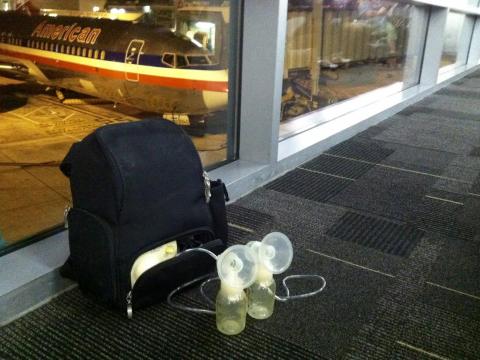
Photo courtesy of author
Frequent travel is part of my job. When still breastfeeding, I often flew to work with my breast pump and storage bags; flew home with my breast milk in coolers. During that 30 months, my dear pump and coolers have been to Los Angeles, Phoenix, Columbus, Austin, Taipei, and other cities with me. They were my best travel buddies.
It was never easy, of course. Carrying extra luggage, finding time and place to pump, figuring out ways to store and ship the milk, going through the TSA security check… all of these make my business trips harder. I took it as a norm. Like all the other working mothers, I am always seeking a balance between work and family, and this, I thought, was a small price that I have to pay.
But recently I learned that there are companies pay for lactating moms to ship breast milk home to their infants while traveling for work. Among them are tech giant IBM, consulting firm Accenture, and EY. EY has been offering the benefit to its employees for several years, and IBM announced the policy last July. Accenture joined them one month later.
I am thrilled, knowing that there are companies really trying to make the lives of working moms a little bit easier, and paying for working moms to ship their breast milk.
My life would be so much easier if my previous employer had a similar policy. The sad reality was it didn’t even accommodate me with reasonable time and space to pump at work.
In an interview with Fortune, Accenture’s chief HR officer Ellyn Shook said that along with the new breast milk shipping program, the company announced a series of parental benefits, including making hospital-grade breast pumps available to female employees in the U.S., 16 weeks of paid parental leave for birth mothers, now-formalized opportunity to work locally for one year following parents’ return from leave, 80 hours per year of back-up dependent care for children, spouses or elderly family members paid for by the company up from 40 hours, and online parenting education for U.S. employees.
Shook said the policies will make the work-life situation easier and more attractive to employees. This is an effort of the company to help attract millennials, who are the group that are more interested in getting more time with their little ones after childbirth. It’s a win-win.
Any policy intended to help parents find balance between work and family is important. It is important for our family, our nation, our economy, and our future. Take France as an example. It has long had an extensive policy in favor of families. It provides a wide range of subsidized childcare services and a generous and varied allowances system, especially for large families. This is the principal behind the resources intended to help parents find a better balance between work and family life. This series of measures approved to be working well: France is amongst the European Union member states with the highest fertility and employment rates of women with children.
Helping employees balance work and non-work responsibilities has been a growing concern of corporations since the 1980s, when more women entered the workplace. Now women make half of the total work force. While supporting working parents has became a norm for employers in France, here in the U.S. we are still in a work culture that prizes total availability at the office.
Could company-sponsored breast milk mailings (and other policies that help make working mother’s life easier) become the new normal? Let’s hope so.



The views and opinions expressed in this post are those of the author(s) and do not necessarily reflect those of MomsRising.org.
MomsRising.org strongly encourages our readers to post comments in response to blog posts. We value diversity of opinions and perspectives. Our goals for this space are to be educational, thought-provoking, and respectful. So we actively moderate comments and we reserve the right to edit or remove comments that undermine these goals. Thanks!